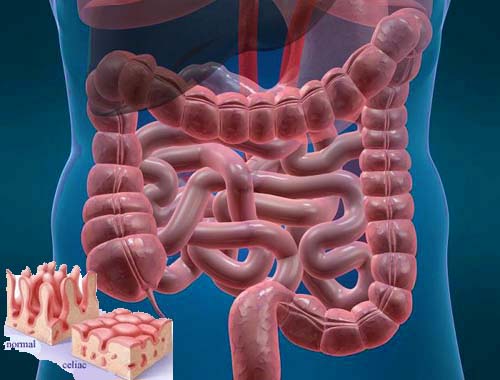Celiac Disease

Published: 18 Jun 2025
ICD9: 579.0 ICD10: K90.0 ICD11: DA95
Celiac disease is an autoimmune disorder where the ingestion of gluten leads to damage in the small intestine.
Gluten is a protein found in wheat, rye, and barley.
Here's a breakdown of what happens:
![]() Gluten Triggers an Immune Response: In people with celiac disease, gluten triggers an abnormal immune response in the small intestine.
Gluten Triggers an Immune Response: In people with celiac disease, gluten triggers an abnormal immune response in the small intestine.
![]() Damage to the Villi: This immune response damages the villi, which are small, finger-like projections lining the small intestine. Villi are crucial for absorbing nutrients from food.
Damage to the Villi: This immune response damages the villi, which are small, finger-like projections lining the small intestine. Villi are crucial for absorbing nutrients from food.
![]() Malabsorption: When the villi are damaged (a condition called villous atrophy), the small intestine cannot properly absorb nutrients, leading to malabsorption.
Malabsorption: When the villi are damaged (a condition called villous atrophy), the small intestine cannot properly absorb nutrients, leading to malabsorption.
![]() Symptoms and Complications: Malabsorption can cause a wide range of symptoms and, if left untreated, can lead to serious health complications.
Symptoms and Complications: Malabsorption can cause a wide range of symptoms and, if left untreated, can lead to serious health complications.
Key aspects of Celiac Disease:
![]() Autoimmune: The body's own immune system attacks the small intestine.
Autoimmune: The body's own immune system attacks the small intestine.
![]() Genetic: There's a genetic predisposition to celiac disease, meaning it tends to run in families. However, having the genes doesn't guarantee someone will develop the disease.
Genetic: There's a genetic predisposition to celiac disease, meaning it tends to run in families. However, having the genes doesn't guarantee someone will develop the disease.
![]() Triggered by Gluten: Gluten is the specific trigger that initiates the autoimmune response.
Triggered by Gluten: Gluten is the specific trigger that initiates the autoimmune response.
![]() Small Intestine Damage: The primary site of damage is the small intestine.
Small Intestine Damage: The primary site of damage is the small intestine.
![]() Malabsorption: The damaged villi lead to difficulty absorbing nutrients.
Malabsorption: The damaged villi lead to difficulty absorbing nutrients.
Common symptoms can include:
![]() Digestive issues: Diarrhea, constipation, bloating, gas, abdominal pain, nausea, vomiting
Digestive issues: Diarrhea, constipation, bloating, gas, abdominal pain, nausea, vomiting
![]() Malabsorption symptoms: Weight loss, anemia (iron deficiency), fatigue, bone pain, osteoporosis, skin rashes (dermatitis herpetiformis), mouth ulcers, headaches, neurological symptoms (like numbness or tingling in the hands and feet), and fertility problems.
Malabsorption symptoms: Weight loss, anemia (iron deficiency), fatigue, bone pain, osteoporosis, skin rashes (dermatitis herpetiformis), mouth ulcers, headaches, neurological symptoms (like numbness or tingling in the hands and feet), and fertility problems.
![]() In children: Failure to thrive, delayed growth, irritability, and dental enamel defects.
In children: Failure to thrive, delayed growth, irritability, and dental enamel defects.
Diagnosis:
![]() Blood tests: To look for specific antibodies that indicate an immune reaction to gluten.
Blood tests: To look for specific antibodies that indicate an immune reaction to gluten.
![]() Endoscopy with biopsy: A small sample of tissue is taken from the small intestine during an endoscopy and examined under a microscope to look for villous atrophy.
Endoscopy with biopsy: A small sample of tissue is taken from the small intestine during an endoscopy and examined under a microscope to look for villous atrophy.
![]() Genetic testing: To identify the presence of genes associated with celiac disease.
Genetic testing: To identify the presence of genes associated with celiac disease.
Treatment:
![]() Strict Gluten-Free Diet: The only effective treatment for celiac disease is a strict, lifelong gluten-free diet. This allows the small intestine to heal and prevents further damage.
Strict Gluten-Free Diet: The only effective treatment for celiac disease is a strict, lifelong gluten-free diet. This allows the small intestine to heal and prevents further damage.
![]() Nutritional Supplementation: If there are nutrient deficiencies, supplements may be recommended (e.g., iron, vitamin D, calcium).
Nutritional Supplementation: If there are nutrient deficiencies, supplements may be recommended (e.g., iron, vitamin D, calcium).
![]() Monitoring: Regular follow-up appointments with a doctor or dietitian are important to monitor symptoms, nutrient levels, and overall health.
Monitoring: Regular follow-up appointments with a doctor or dietitian are important to monitor symptoms, nutrient levels, and overall health.
It's important to note that celiac disease can be difficult to diagnose because its symptoms can be similar to other conditions. If you suspect you might have celiac disease, it's crucial to see a doctor for proper testing and diagnosis before starting a gluten-free diet. Starting a gluten-free diet before testing can make it difficult to get an accurate diagnosis.